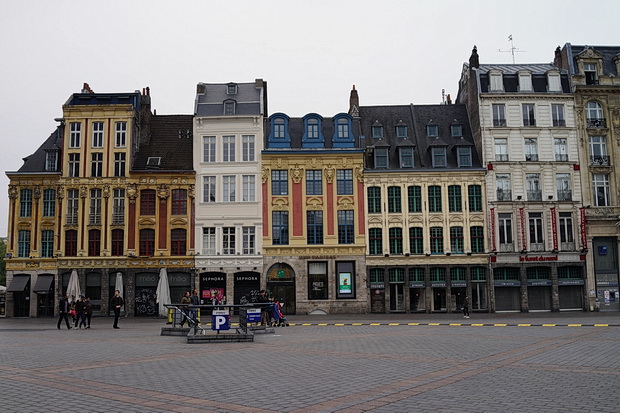
Last weekend, I travelled with the Monochrome Set to play a show in the northern French city of Lille. In between soundchecking, playing and drinking, I managed to hotfoot it onto the streets to grab these seventy-odd photos.
Getting to Lille couldn’t be any easier, with the Eurostar train running direct from St Pancras to the centre of the town.
Ten trains make the journey every day, with the average time between Lille and London St-Pancras being 2 hours and 32 minutes. The fastest journey time is an extra-speedy 1 hour and 22 minutes.
Leaving the modern and rather uninspiring international station.
As of 2009, Lille had a population of 226,827 within its administrative limits, and an urban population of 1,015,744, making it the fourth largest urban area in France after Paris, Lyon and Marseille.
Looking like an oversized ski boot, the 1995 Tour de Lille building is located on Boulevard de Turin and rises 120 meters high with 20 floors.
Designed by architect Christian de Portzamparc, the façade is made of light green glass and overhangs the Gare Lille-Europe station.
The ‘Hel Oninenta’.
Away from the bland, modernised centre, there’s loads of interesting back streets to explore.
Historic facade, dating from 1649.
“Old Lille Sucks.”
Intricate door detail.
Posters.
“Monsieur Michel Mareels, Expert Immobilier.” Now that’s a name plate.
Look at the cupola on that.
The following morning, France went to the polls, with the populace offered an unsavoury choice between former investment banker Emmanuel Macron and poisonous far right-wing racist, Marine Le Pen.
Thankfully, the lesser of two evils prevailed, with Macron garnering two thirds of the vote.
View from my hotel.
Close to the station is this soulless modern shopping centre, dominated by big brands Primark and Carrefour.
It forms part of the ‘urban quarter’ which opened from 1994, with the Euralille development (above) opening in 2000. [—]
Incidentally, Carrefour, the French supermarket chain, opened up the first ‘hypermarket’ ever seen in the UK in 1972 in the rather unexpected and gritty location of Caerphilly, south Wales.
Inside the Euralille shopping mall.
Looking over the railway tracks of the Gare Des Lilles, Flandres.
We were playing L’Aéronef in Lille, which is around the back of the Euralille development.
Unlike the shiny retail facade, the building already looks run down, with peeling paint and several escalators out of service.
Decent selection of stickers on the backstage door.
The industrial chic of the L’Aéronef venue. The sound guys and staff were great, as was the gig!
Construction of the Gothic style Église Saint-Maurice Roman Catholic church started at the end of the 14th century.
Restoration work was completed by architect Philippe Cannissié in the 19th century, with the building being listed as an historic national monument in 1914.
Knackered old phone boxes.
The rather architecturally muddled belfry of Lille town hall, built in 1932 and standing 104m high.
Porte De Paris, a 17th century flamboyant commemorative monument to Louis XVI.
Street art.
Outside Lille station a lively debate was taking place in the street.
Back to the gig.
This was my drum kit for the night – a splendid Gretsch number. I have a sparkly gold version of this kit.
Support band Scarlet Rascal on stage.
Snapshot from the drum kit taken during a quiet part of our set. The sound was great on stage.
After the show, we visited the lovely Amul Solo bar and drank until the wee small hours.
The next morning I took a nippy strut around town before the train back to London.
Street art.
Gare Des Lilles Flandres, the main railway station of Lille, capital of French Flanders.
A terminus for SNCF Intercity and regional trains, it opened in 1842 as the Gare du Lille, but was renamed in 1993 when Lille Europe station opened.
Impressive arched roof.
It was blooming freezing in the morning , so there wasn’t too many people out on the streets.
The Chambre de Commerce de Lille was built between 1910 and 1921 and designed by architect Louis-Marie Cordonnier.
Constructed in a Neo-Flemish style, the belfry stands 76 meters high.
Empty seats in the city square.
The splendid Art Deco façade of La Cloche d’Or jewellery store.
Empty square.
War memorial.
La Voute bar/tabac and Alcide restaurant.
Second hand fair.
The Neoclassical Opéra de Lille, built between 1907 and 1913 to a design by architect Louis Marie Cordonnier.
Bent sign.


